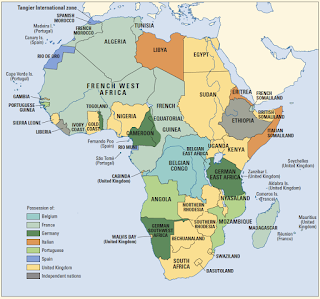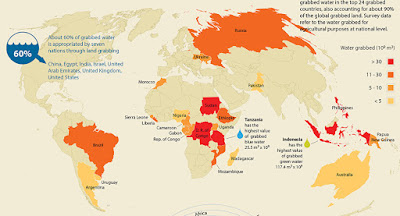History of Water Politics on the Nile: A colonial view
“Whenever the water supply is good and the land fertile, there we must place colonists without worrying about previous owners. We must distribute the lands full title to the colonists” French governor of Algeria, General Bugeaud (Kimenyi and Mbaku, 2015).
Hello, and welcome back to my blog! This week I want to look back into the colonial past of water management in Africa, to bring to light the history underlying current issues of inequitable governance of the Niles shared resources.
 |
| Colonial Africa 1912 (World Bank Development Report, 2009) |
1) Colonialists used their superior military and police power to bring together various ethnic groups, each with different values and cultures, forming a political and economic community held together by (mostly brutal) force.
2) Colonialists introduced their own laws and institutions on colonies. These were not imposed to guide African communities to effectively govern themselves and allocate their own resources, instead, they were to provide benefits to the European colonialists.
UK and Egypt
A variety of treaties and frameworks were introduced during the colonial era, in 1891 the Anglo-Italian protocol between Great Britain and Italy was implemented regarding how to settle the boundary between Italian Eritrea and British Sudan concerning dealing with water-related issues. In 1902, the Anglo-Ethiopian treaty involving UK, Ethiopia and Italy was formed to settle the boundary between Sudan which at the time was a British Colony (Kimenyi and Mbaku, 2015b). However, the treaty I want to look at is the 1929 Anglo-Egyptian treaty involving the UK and Egypt with regards to the utilisation of the Niles resources. This is a compelling case, as Egypt was under British rule and as a condition of this agreement the UK granted Egypt 48 billion cubic meters of water as well as giving them veto power over construction projects on the Nile. However, the purpose of this was not to benefit Egypt’s population, it was out of British self-interest regarding Egypt's agricultural potential.
Cotton Famine
Before the Civil War cotton was mass produced in the USA, however, the cotton industry relied heavily on slave labour, which was being abolished around this time. In doing so, southern ship ports where cotton was exported from were shut down, having a significant impact on the British cotton industry. Consequently, this led to a boom in Egyptian agriculture making it a one-crop economy producing cotton. Egyptian cotton became a leading industry for British textile companies and recognisably depended on water from the Nile for its production (Brady, 1963). As a result, “the British set out to develop, in Egypt, a policy of total dominance of the Nile” (Kimenyi and Mbaku, 2015a p25). Thus, the movement to provide Egypt with power over the Nile was not intended to improve Egyptian livelihoods or consider their needs, desires and traditions- it was indented to safeguard the interests of the British power to keep the cotton industry and colonial power booming.
These treaties formed in the colonial period consistently show evidence European self-interest, however, had not been reformed after African independence. The notion that Egypt still holds power over the Nile is based off outdated policies that do not consider the growing needs of other riparian states whose populations have changed and developed significantly since the colonial era. This historical background provides the basis of other riparian states demanding a new international regime to be put in place, enhancing equity in the allocation of the Nile Rivers waters.
In my next blog post, I aim to look at post-colonial Africa, and how these colonial agreements influenced Egypt’s power over the construction of the Aswan Dam.



Comments
Post a Comment